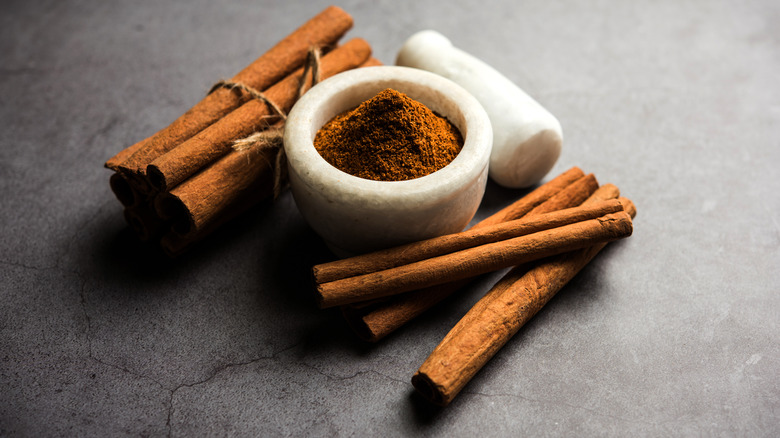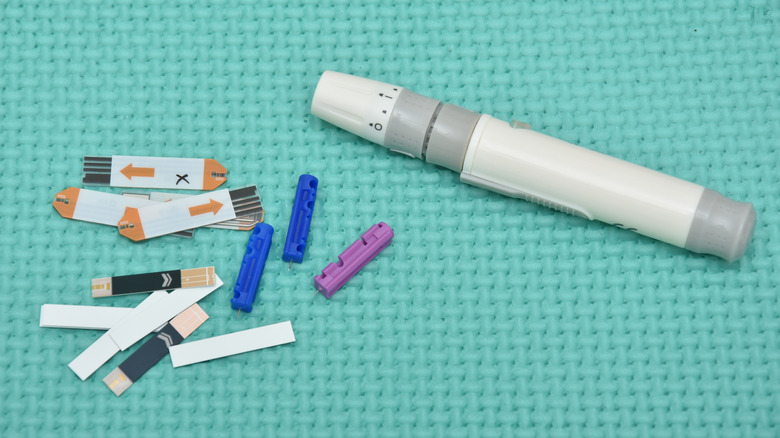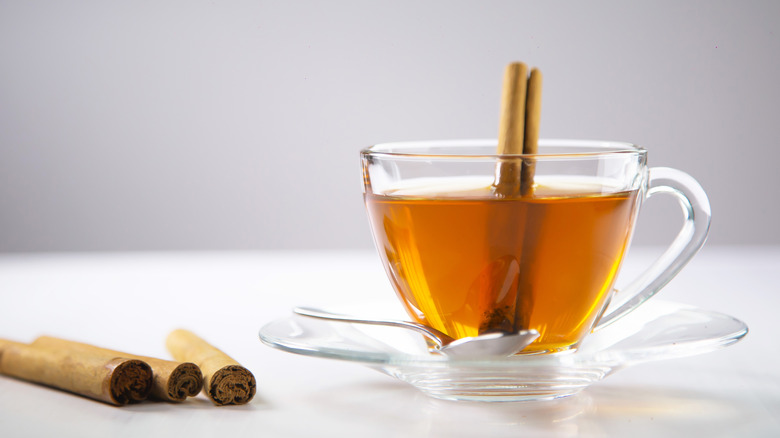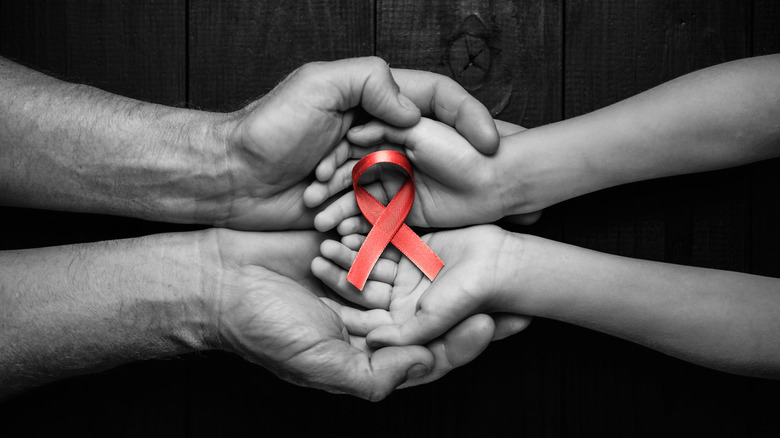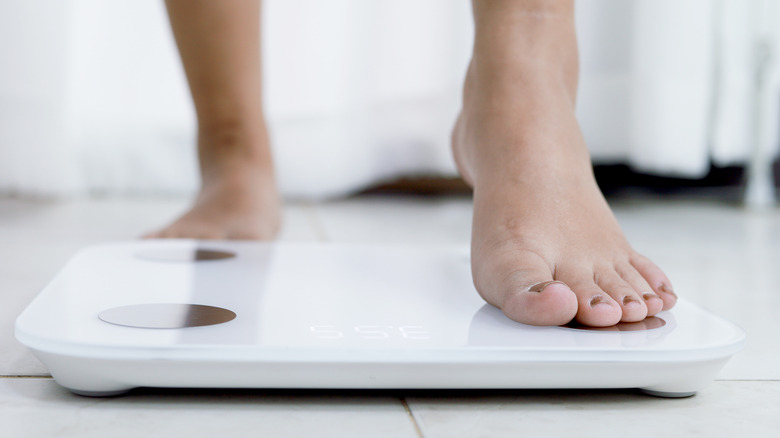When You Eat Cinnamon Every Day, This Is What Happens
It's a little bit sweet, a little bit spicy, and, as it turns out, surprisingly good for your health. Cinnamon has been used in many cultures across the world, even as far back as ancient Egypt and China (via The Spruce). While we might think of cinnamon as nothing more than a flavorful addition to oatmeal, cookies, baked goods, and even irresistible sticky buns, people living in antiquity might have been onto something in the way they used cinnamon medicinally. This spice has the potential to provide all kinds of benefits to the body.
Unfortunately, consuming just a few teaspoons of cinnamon every day isn't enough to undo the damage that comes from unhealthy habits. However, if you like the taste and are inclined to enjoy it anyway, you might be pleased to learn that the cinnamon you sprinkle over your favorite sweets could mean a boost to the way you feel and function. Here's what you can expect to happen when you eat cinnamon every day.
Your blood sugar may improve
For people who have diabetes or who are at risk of developing diabetes, the need to closely monitor blood sugar levels is a daily concern. But eating cinnamon on the regular could help these individuals maintain proper blood sugar levels, according to a 2010 study published in the Journal of Diabetes Science and Technology. Researchers have found that compounds in cinnamon mimic insulin, so when you eat cinnamon, your body has an easier time sending glucose to your cells.
However, it's important to note that there's not enough research to conclusively say that cinnamon is an effective treatment method for diabetes, according to the Mayo Clinic. Instead, people with diabetes should bear in mind they must continue healthy practices like watching their diet, getting plenty of physical activity, and taking their prescribed medications. Relying on any one food (or in this case, any one spice) to treat a chronic health condition is not a responsible idea.
Your cholesterol improves
Just as people with diabetes must carefully monitor their blood sugar levels, those with high cholesterol need to watch their blood lipids. And cinnamon might make a slight difference here too, according to Verywell Health.
In this case, it's a compound called cinnamaldehyde found in cinnamon that we have to thank for the potential health benefit. Cinnamaldehyde, which gives cinnamon its distinctive warm flavor, might suppress the enzymes in your body that create cholesterol, thus reducing the amount of fat in your bloodstream. Some studies point to groups of human test subjects whose total cholesterol, LDL cholesterol (aka "bad" cholesterol), and triglyceride levels all went down after taking cinnamon supplements (via Verywell Health). Additionally, the subjects' HDL cholesterol (aka "good" cholesterol) did not go down.
It's important to note that, though, that more research is needed. Therefore, people who have high cholesterol should not depend exclusively on cinnamon consumption to improve their condition.
You may find relief from arthritis pain
If you suffer from arthritis or another type of chronic pain, you're probably familiar with the term inflammation. This refers to your body's reaction to infection or injury. Acute inflammation is actually a natural part of your healing process, according to Harvard Health. Think about banging your arm on something and seeing your elbow swell up, turn red, and throb with a little bit of soreness for the next few hours. "When the body signals an injury, your immune system sends out an army of white blood cells to surround and protect the area," the publication explained. However, it's not a good thing if "white blood cells ... end up attacking nearby healthy tissues and organs" and spread to the rest of the body. This is what's known as chronic inflammation.
According to the Arthritis Foundation, cinnamon might be one of several spices that can help relieve the pain brought on by chronic inflammation. This may be because the compound cinnamaldehyde is able to prevent or lessen the damage caused by free radicals. It's important to note that cinnamon should be consumed in addition to other anti-inflammatory foods to truly achieve a noticeably reduced level of inflammation. Other spices that help with inflammation include turmeric, ginger, and cayenne.
Your oral health improves
Got bad breath? Cinnamon can help. If you've ever used cinnamon toothpaste or chewed a piece of cinnamon gum, you know that cinnamon has a great smell that's strong enough to mask any unpleasant odors lingering from your last meal. But it turns out that cinnamon does more for your oral health than just masking odors.
According to a study published by Acta Biomed, cinnamon oil has the potential to kill oral bacteria that cause things like bad breath and even cavities. Gentle Dental even recommends chewing on cinnamon sticks, citing this practice as a long-standing but reliable home remedy for those days when your mouth just doesn't feel (or smell) as clean as you'd like.
Want to get a little fancier? Taste of Home recommends making a natural mouthwash by boiling a cup of water with 5 cinnamon sticks. After it cools, use it as you would traditional mouthwash. Your breath will feel fresh almost instantly!
Your risk of dementia decreases
While cinnamon can't serve as a cure or even a fully preventative method, cinnamon may play a role in helping stave off the development of Alzheimer's disease. Once again, it's the compound cinnamaldehyde that might be to credit for this prevention.
Alzheimers.net explains that a type of protein called tau forms in the brain, and researchers believe that when these tau proteins clump together, they can lead to Alzheimer's disease. Although the formation of tau clumps is a natural part of the aging process, researchers have observed that people with Alzheimer's have more clumps of tau proteins than people without the disease, suggesting that they play a role in neurodegeneration.
How can cinnamon help? According to research published in the Journal of Alzheimer's Disease, cinnamaldehyde, along with another compound called epicatechin, can stop these formations of tau proteins from collecting in the brain, thus potentially helping prevent Alzheimer's disease.
Your digestive health improves
Whether you ate something that disagreed with you or you're dealing with the effects of a stomach bug, you surely don't want to suffer through an upset digestive tract. Fortunately, cinnamon might be able to help you feel a little bit better, according to BBC. This starts with the fact that cinnamon supports the growth of the good-for-you kind of bacteria that naturally occurs in your gut. But more importantly, it's what's known as a carminative, or an antiflatulence product. This is why ancient medicine all around the world, particularly in Ayurveda, has looked to cinnamon as a way of treating gassiness.
On top of this, cinnamon naturally has a warming effect that can boost your circulation and the transportation of oxygen, both of which are important if you're trying to improve your digestion (via Healthline). Eating cinnamon the traditional way — sprinkled on your food or baked into recipes — is an effective method, but you can also boil cinnamon in liquid as a beverage and drink it the way you would tea.
Cinnamon can play a role in fighting HIV and AIDS
Since the HIV and AIDS epidemic of the 1980s, health experts have sought a way of properly curing and treating this virus that causes immunodeficiency and, according to CNN, some researchers believe that cinnamon can play a role in keeping HIV-positive patients healthy. Thanks to its flavonoids, cinnamon can prevent the human immunodeficiency virus from infecting cells in the human body much the same way the HIV drug AZT does. This was observed in a study published in Antiviral Chemistry and Chemotherapy, which also looked at extracts from elderberry and green tea.
So what does this mean for people living with HIV or AIDS? Well, unfortunately, it doesn't mean that cinnamon can help prevent the development of the disease, and patients should continue taking their prescribed medication. However, it may be able to prevent worsening infections. More importantly, it may mean researchers are on their way to developing additional treatment options.
You reduce your risk of illness
If you were to compare the compounds found in cinnamon with the compounds in other products on your spice rack, you might be surprised. A study published in the Journal of Agricultural and Food Chemistry found that cinnamon has higher levels of antioxidants compared to dozens of other spices and herbs. Additionally, a separate study found cinnamon has the fourth-highest level of antioxidants among 500 other foods (via AARP).
These antioxidants are what help your body fight the wear and tear you suffer on a daily basis from things like pollution, junk food, and UV light, all of which can cause harm to your body's cells and lead to serious disease like cancer (via Insider). By eating an antioxidant-rich diet with foods like cinnamon, you're equipping your body to fight this damage and prevent the development of these diseases. Specifically, the types of antioxidants found in cinnamon are plant compounds known as polyphenols, the same type of antioxidant found in foods like tea, cocoa, red wine, and olive oil.
You may find some relief from period pains
It doesn't seem fair that menstruating women have to suffer so much pain and discomfort for several days every month. But the good news is that cinnamon might be able to offer a little bit of relief.
According to Healthline, cinnamon has been shown to reduce many of the negative aspects of menstruation, including cramps, nausea, and vomiting. Cinnamon may even make periods lighter and PMS symptoms not as extreme. In one 2015 study published in the Journal of Clinical and Diagnostic Research, groups of women were given cinnamon, a placebo, or pain medicine. "Cinnamon compared with placebo significantly reduced the severity and duration of pain during menstruation, but this effect was lower compared with Ibuprofen," wrote the researchers.
If you find yourself craving a cinnamon bun the next time you're on your period, well, go ahead and treat yourself. Just remember that the cinnamon bun isn't going to be as effective as painkillers.
You might lose weight
If you've been struggling to lose weight or improve your eating habits and find yourself craving sweets way too often, cinnamon might be the answer you've been looking for. As Today pointed out, cinnamon adds a little bit of natural sweetness to your food without all the empty calories you would normally get from sugar. In fact, cinnamon even offers a little bit of fiber (approximately 1 gram per teaspoon), so you get a slight boost when you add cinnamon to your bowl of oatmeal or cup of coffee instead of a spoonful of sugar.
There are other ways cinnamon might even help you lose weight. According to a study published in The American Journal of Clinical Nutrition, cinnamon slows down the rate at which your stomach empties and can increase your feelings of satiety, so you're more likely to feel full faster and stay fuller for longer.

